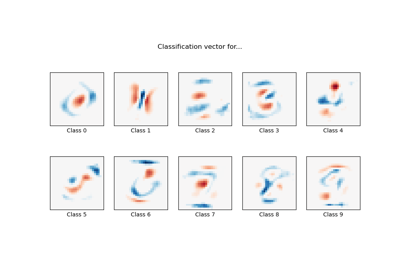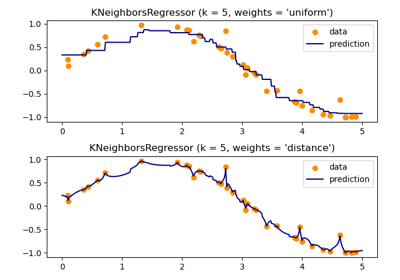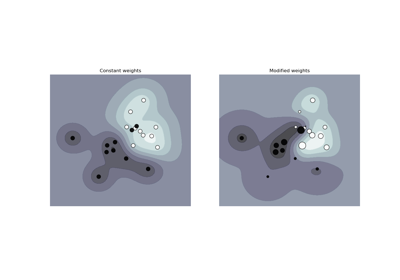注意
跳转到底部 下载完整示例代码。或通过 JupyterLite 或 Binder 在浏览器中运行此示例
MNIST 上的 MLP 权重可视化#
有时,查看神经网络学习到的系数可以深入了解其学习行为。例如,如果权重看起来没有结构,可能有些根本没有被使用;或者如果存在非常大的系数,可能是正则化太低或学习率太高。
本示例展示了如何在 MNIST 数据集上绘制 MLPClassifier 训练得到的第一个隐藏层的部分权重。
输入数据是 28x28 像素的手写数字,数据集中有 784 个特征。因此,第一个隐藏层的权重矩阵形状为 (784, hidden_layer_sizes[0])。我们可以将权重矩阵的单列可视化为 28x28 像素的图像。
为了让示例运行更快,我们使用了非常少的隐藏单元,并且只进行了很短时间的训练。如果训练时间更长,权重将会呈现出更平滑的空间分布。由于我们在持续集成基础设施上定期构建此文档时存在资源使用限制,本示例会发出一个不收敛的警告,这正是我们希望的结果。

Iteration 1, loss = 0.44139186
Iteration 2, loss = 0.19174891
Iteration 3, loss = 0.13983521
Iteration 4, loss = 0.11378556
Iteration 5, loss = 0.09443967
Iteration 6, loss = 0.07846529
Iteration 7, loss = 0.06506307
Iteration 8, loss = 0.05534985
Training set score: 0.986429
Test set score: 0.953061
# Authors: The scikit-learn developers
# SPDX-License-Identifier: BSD-3-Clause
import warnings
import matplotlib.pyplot as plt
from sklearn.datasets import fetch_openml
from sklearn.exceptions import ConvergenceWarning
from sklearn.model_selection import train_test_split
from sklearn.neural_network import MLPClassifier
# Load data from https://www.openml.org/d/554
X, y = fetch_openml("mnist_784", version=1, return_X_y=True, as_frame=False)
X = X / 255.0
# Split data into train partition and test partition
X_train, X_test, y_train, y_test = train_test_split(X, y, random_state=0, test_size=0.7)
mlp = MLPClassifier(
hidden_layer_sizes=(40,),
max_iter=8,
alpha=1e-4,
solver="sgd",
verbose=10,
random_state=1,
learning_rate_init=0.2,
)
# this example won't converge because of resource usage constraints on
# our Continuous Integration infrastructure, so we catch the warning and
# ignore it here
with warnings.catch_warnings():
warnings.filterwarnings("ignore", category=ConvergenceWarning, module="sklearn")
mlp.fit(X_train, y_train)
print("Training set score: %f" % mlp.score(X_train, y_train))
print("Test set score: %f" % mlp.score(X_test, y_test))
fig, axes = plt.subplots(4, 4)
# use global min / max to ensure all weights are shown on the same scale
vmin, vmax = mlp.coefs_[0].min(), mlp.coefs_[0].max()
for coef, ax in zip(mlp.coefs_[0].T, axes.ravel()):
ax.matshow(coef.reshape(28, 28), cmap=plt.cm.gray, vmin=0.5 * vmin, vmax=0.5 * vmax)
ax.set_xticks(())
ax.set_yticks(())
plt.show()
脚本总运行时间: (0 分 6.323 秒)
相关示例




